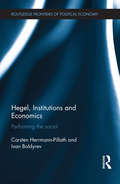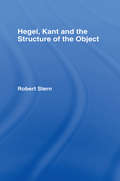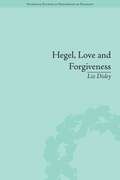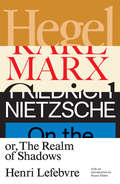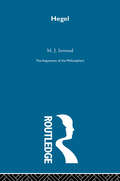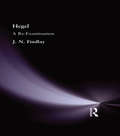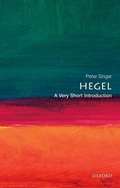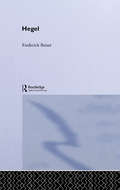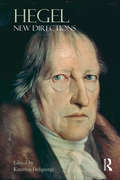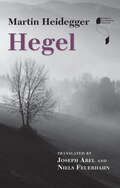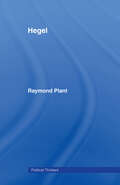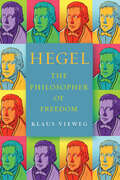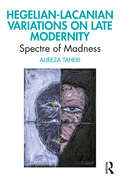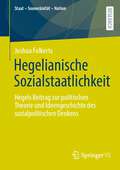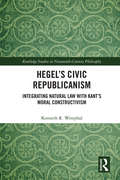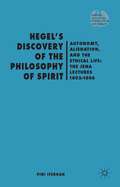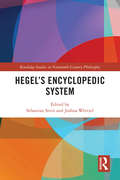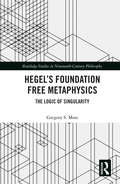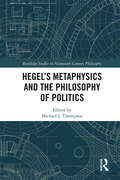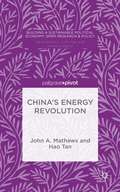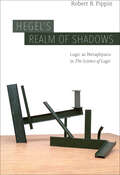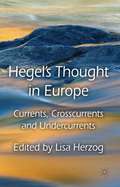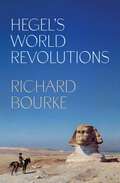- Table View
- List View
Hegel, Institutions and Economics: Performing the Social (Routledge Frontiers of Political Economy)
by Ivan Boldyrev Carsten Herrmann-PillathHegel’s philosophy has witnessed periods of revival and oblivion, at times considered to be an unrivalled and all-embracing system of thought, but often renounced with no less ardour. This book renews the dialogue with Hegel by looking at his legacy as a source of insight and judgement that helps us rethink contemporary economics. This book focuses on a concept of institution which is equally important for Hegel's political philosophy and for economic theory to date. The key contributions of this Hegelian perspective on economics lead us to the synthesis of traditional approaches and new ideas gained in economic experiments and advanced by neuroeconomists, sociologists and cognitive scientists. The proper account of contemporary 'civil society' involves comprehending it as a historically evolving totality of individual minds, ideas and intersubjective structures that are mutually dependent, tied by recognitive relations, and assert themselves as a whole in the ongoing performative movement of 'objective spitit'. The ethics of recognition is paired with the ethics of associations that supports moral principles and gives them true, concrete universality. This unusual constellation of seemingly remote fields suggests that Hegel, read in a pragmatist mode, anticipated the new theories and philosophies of extended mind, social cognition and performativity. By providing a new conceptual apparatus and reformulating the theory of institutions in the light of this new synthesis, this book claims to give new meaning both to Hegel as interpreted from today, and to the social sciences. Seen from this perspective, such phenomena as cooperation in games, personal identity or justice in the version of Amartya Sen's 'realization-focused comparisons' are reinscribed into the logic of institutional theory. This 'Hegel' clearly goes beyond the limits of philosophical discussion and becomes a decisive reference for economists, sociologists, political scientists and other scholars who study the foundations and consequences of human sociality and try to explore and design the institutions necessary for a worthy common life.
Hegel, Kant and the Structure of the Object
by Robert SternHegel's holistic metaphysics challenges much recent ontology with its atomistic and reductionist assumptions; Stern offers us an original reading of Hegel and contrasts him with his predecessor, Kant.
Hegel, Love and Forgiveness: Positive Recognition in German Idealism (Pickering Studies in PHIL of Religion #3)
by Liz DisleyThis study offers a new interpretation of Hegelian recognition focusing on positive ethical behaviours, such as love and forgiveness. Building on the work of Simone de Beauvoir and Jean-Paul Sartre, Disley reassesses Hegel’s work on the subject/object dialectic and explores the previously neglected theological dimensions of his work.
Hegel, Marx, Nietzsche: Or the Realm of Shadows
by Henri LefebvreThe great French Marxist philosopher weighs up the contributions of the three major critics of modernityWith the translation of Lefebvre's philosophical writings, his stature in the English-speaking world continues to grow. Though certainly within the Marxist tradition, he consistently saw Marx as an 'unavoidable, necessary, but insufficient starting point'. Unsurprisingly, Lefebvre always insisted on the importance of Hegel to understanding Marx. But the imposing Metaphilosophy also suggested the significance he ascribed to Nietzsche, in the 'realm of shadows' through which philosophy seeks to think the world. Lefebvre proposes here that the modern world is at the same time Hegelian in terms of the state; Marxist in terms of the social and society; and Nietzschean in terms of civilization and its values. As early as 1939, Lefebvre pioneered a French reading of Nietzsche that rejected the philosopher's appropriation by fascism, bringing out the tragic implications of Nietzsche's proclamation that 'God is dead' long before this approach was followed by such later writers as Foucault, Derrida and Deleuze. Forty years later, in the last of his philosophical writings, Lefebvre juxtaposes the contributions of the three great thinkers, in a text whose themes remain surprisingly relevant today.
Hegel, the End of History, and the Future
by Eric Michael DaleIn Phenomenology of Spirit (1806) Hegel is often held to have announced the end of history, where 'history' is to be understood as the long pursuit of ends towards which humanity had always been striving. In this, the first book in English to thoroughly critique this entrenched view, Eric Michael Dale argues that it is a misinterpretation. Dale offers a reading of his own, showing how it sits within the larger schema of Hegel's thought and makes room for an understanding of the 'end of history' as Hegel intended. Through an elegant analysis of Hegel's philosophy of history, Dale guides the reader away from the common misinterpretation of the 'end of history' to other valuable elements of Hegel's arguments which are often overlooked and deserve to endure. His book will be of great interest to scholars and advanced students of Hegel, the philosophy of history, and the history of political thought.
Hegel-Arg Philosophers
by M. J. InwoodFirst published in 1999. Routledge is an imprint of Taylor & Francis, an informa company.
Hegel: A Re-Examination (Muirhead Library Of Philosophy Ser.)
by Findlay, J NFirst published in 2002. Routledge is an imprint of Taylor & Francis, an informa company.
Hegel: A Very Short Introduction
by Peter SingerHegel is regarded as one of the most influential figures on modern political and intellectual development. After painting Hegel's life and times in broad strokes, Peter Singer goes on to tackle some of the more challenging aspects of Hegel's philosophy. Offering a broad discussion of Hegel's ideas and an account of his major works, Singer explains what have often been considered abstruse and obscure ideas in a clear and inviting manner.
Hegel: German Philosophy, 1840-1900 (The Routledge Philosophers)
by Frederick BeiserHegel (1770-1831) is one of the major philosophers of the nineteenth century. Many of the major philosophical movements of the twentieth century - from existentialism to analytic philosophy - grew out of reactions against Hegel. He is also one of the hardest philosophers to understand and his complex ideas, though rewarding, are often misunderstood. In this magisterial and lucid introduction, Frederick Beiser covers every major aspect of Hegel's thought. He places Hegel in the historical context of nineteenth-century Germany whilst clarifying the deep insights and originality of Hegel's philosophy.A masterpiece of clarity and scholarship, Hegel is both the ideal starting point for those coming to Hegel for the first time and essential reading for any student or scholar of nineteenth century philosophy.Additional features: glossary chapter summaries chronology annotated further reading.
Hegel: New Directions
by Katerina DeligiorgiOver the last decade renewed interest in Hegel's thought and its legacy, especially in Anglo-American philosophy, has combined with the publication of new critical editions of his work in German to underline the value of Hegel for contemporary philosophy. "Hegel: New Directions" takes stock of this re-evaluation and presents an assessment of current thinking on this seminal philosopher. Leading scholars, who have spearheaded the reappraisal, bring the history of philosophy into dialogue with contemporary philosophical questions. Drawing on a broad range of themes, the essays offer a critical and stimulating guide to Hegel's thought, whilst addressing central questions of contemporary philosophy in epistemology, ethics, political and social theory, religion, philosophy of nature and aesthetics.
Hegel: The 1934-35 Seminar And Interpretive Essays (Studies in Continental Thought)
by Martin HeideggerThis “excellent translation” of Heidegger’s writings on Hegel shows an essential engagement between two of the foundational thinkers of phenomenology (Phenomenological Reviews).While Martin Heidegger’s writings on Hegel are notoriously difficult, this volume provides a clear and careful translation of two important texts—a treatise on negativity, and a penetrating reading of Hegel’s Phenomenology of Spirit.In these stimulating works, Heidegger relates his interpretation of Hegel to his own thought on the event, taking up themes developed in Contributions to Philosophy. While many parts of the text are fragmentary in nature, these interpretations are considered some of the most significant as they bring Hegel into Heidegger’s philosophical trajectory.
Hegel: The Great Philosophers (The\great Philosophers Ser. #8)
by Raymond PlantFirst published in 1973 this volume demonstrates the interconnection between Hegel's political and metaphysical writings. This book provides a point of entry into Hegel's system of ideas. Condemned unread, and when read far too often misunderstood, Hegel's thought has once more begun to make its impact on contemporary ideas with many of today's most important social and political thinkers.
Hegel: The Philosopher of Freedom
by Klaus ViewegA monumental new biography of a pivotal yet poorly understood pioneer in modern philosophy. When a painter once told Goethe that he wanted to paint the most celebrated man of the age, Goethe directed him to Georg Wilhelm Friedrich Hegel. Hegel worked from the credo: To philosophize is to learn to live freely. While he was slow and cautious in the development of his philosophy, his intellectual growth was like an odyssey of the mind, and, contrary to popular belief, his life was full of twists and turns, suspense and even danger. In this landmark biography, the philosopher Klaus Vieweg paints a new picture of the life and work of the most important representative of German idealism. His vivid portrait provides readers an intimate account of Hegel's times and the milieu in which he developed his thought, along with detailed, clear-sighted analyses of Hegel's four major works. What results is a new interpretation of Hegel through the lens of reason and freedom. Vieweg draws on extensive archival research that has brought to light a wealth of hitherto undiscovered documents and handwritten notes relating to Hegel's work, touching on Hegel's engagement with the leading thinkers and writers of his age: Kant, Fichte, Schelling, Hölderlin, and others. Combatting clichés and misunderstandings about Hegel, Vieweg also offers a sustained defense of the philosopher's more progressive impulses. Highly praised upon its release in Germany as having set the new biographical standard, this monumental work emphasizes Hegel's relevance for today, depicting him as a vital figure in the history of philosophy.
Hegelian-Lacanian Variations on Late Modernity: Spectre of Madness
by Alireza TaheriThe current rise in new religions and the growing popularity of New Ageism is concomitant with an increasingly anti-philosophical sentiment marking our contemporary situation. More specifically, it is philosophical and psychoanalytic reason that has lost standing faced with the triumph of post-secular "spirituality". Combatting this trend, this treatise develops a theoretical apparatus based on Hegelian speculative reason and Lacanian psychoanalysis. With the aid of this theoretical apparatus, the book argues how certain conceptual pairs appear opposed through an operation of misrecognition christened, following Hegel, as "diremption". The failure to reckon with identities-in-difference relegates the subject to more vicious contradictions that define central aspects of our contemporary predicament. The repeated thesis of the treatise is that the deadlocks marking our contemporary situation require renewed engagement with dialectical thinking beyond the impasses of common understanding. Only by embarking on this philosophical-psychoanalytic "path of despair" (Hegel) will we stand a chance of achieving "joyful wisdom" (Nietzsche). Developing a unique dialectical theory based on readings of Hegel, Lacan and Žižek, in order to address various philosophical and psychoanalytic questions, this book will be of great interest to anyone interested in German idealism and/or psychoanalytic theory.
Hegelianische Sozialstaatlichkeit: Hegels Beitrag zur politischen Theorie und Ideengeschichte des sozialpolitischen Denkens (Staat – Souveränität – Nation)
by Joshua FolkertsIn diesem Buch wird erstens Hegels ideengeschichtlicher Beitrag zur Genese von Sozialstaatstheorien herausgearbeitet und zweitens seine politische Theorie für die politiktheoretische Modellierung von Sozialstaatlichkeit fruchtbar gemacht. Mit Hegel lässt sich ein Mittelweg zwischen vor allem ökonomisch orientierter Sozialpolitik und vor allem anerkennungsfokussierter Identitätspolitik einschlagen, der weder mangelnde Anerkennung nur als Epiphänomen ökonomischer Verhältnisse versteht noch freiheitsbeschränkende Armut durch die Einforderung von Respekt für prekäre Lebenslagen normalisiert. Im genuin modernen Konflikt des Auseinandertretens von Gesellschaft und Staat, von sich selbst verwirklichendem Individuum auf dem Markt und der Gemeinschaft, zeichnet sich eine neue zentrale Funktion des Staats ab: Die Garantie der Freiheit für seine Bürger. Der Sozialstaat als Mittel dieser staatlichen Freiheitsgarantie erfüllt somit nicht nur eine bedeutende Rolle in der Versöhnung von Individuum und Gemeinschaft, sondern bildet hierdurch zugleich ein zentrales Legitimationselement des modernen Staats.
Hegel’s Civic Republicanism: Integrating Natural Law with Kant’s Moral Constructivism (Routledge Studies in Nineteenth-Century Philosophy)
by Kenneth R. WestphalIn this book, Westphal offers an original interpretation of Hegel’s moral philosophy. Building on his previous study of the role of natural law in Hume’s and Kant’s accounts of justice, Westphal argues that Hegel developed and justified a robust form of civic republicanism. Westphal identifies, for the first time, the proper genre to which Hegel’s Philosophical Outlines of Justice belongs and to which it so prodigiously contributes, which he calls Natural Law Constructivism, an approach developed by Hume, Rousseau, Kant, and Hegel. He brings to bear Hegel’s adoption and augmentation of Kant’s Critique of rational judgment and justification in all non-formal domains to his moral philosophy in his Outlines. Westphal argues that Hegel’s justification for the standards of political legitimacy successfully integrates Rousseau’s Independence Requirement into the role of public reason within a constitutional republic. In these regards, Hegel’s moral and political principles are progressive not only in principle, but also in practice. Hegel’s Civic Republicanism will be of interest to scholars of moral philosophy, social and political philosophy, Hegel, eighteenth- and nineteenth-century philosophy.
Hegel’s Discovery Of The Philosophy Of Spirit
by Pini Ifergan Nessa Olshansky-AshtarThis exploration of Hegel's critique of the individualistic ethos of modernity and the genesis of his alternative vision traces the conceptual schemes Hegel experimented with to show how he settled on the concepts of 'ethical life' (Sittlichkeit) and Spirit as the means for overcoming subjectivity and domination.
Hegel’s Encyclopedic System (Routledge Studies in Nineteenth-Century Philosophy)
by Sebastian Stein and Joshua WretzelThis book discusses the most comprehensive of Hegel’s works: his long-neglected Encyclopedia of the Philosophical Sciences in Outline. It contains original essays by internationally renowned and emerging voices in Hegel scholarship. Their contributions elucidate fundamental aspects of Hegel’s encyclopedic system with an eye to its contemporary relevance. The book thus addresses system-level claims about Hegel’s unique conceptions of philosophy, philosophical "science" and its method, dialectic, speculative thinking, and the way they relate to both Hegelian and contemporary notions of nature, history, religion, freedom, and cultural praxis.
Hegel’s Foundation Free Metaphysics: The Logic of Singularity (Routledge Studies in Nineteenth-Century Philosophy)
by Gregory S. MossContemporary philosophical discourse has deeply problematized the possibility of absolute existence. Hegel’s Foundation Free Metaphysics demonstrates that by reading Hegel’s Doctrine of the Concept in his Science of Logic as a form of Absolute Dialetheism, Hegel’s logic of the concept can account for the possibility of absolute existence. Through a close examination of Hegel’s concept of self-referential universality in his Science of Logic, Moss demonstrates how Hegel’s concept of singularity is designed to solve a host of metaphysical and epistemic paradoxes central to this problematic. He illustrates how Hegel’s revolutionary account of universality, particularity, and singularity offers solutions to six problems that have plagued the history of Western philosophy: the problem of nihilism, the problem of instantiation, the problem of the missing difference, the problem of absolute empiricism, the problem of onto-theology, and the third man regress. Moss shows that Hegel’s affirmation and development of a revised ontological argument for God’s existence is designed to establish the necessity of absolute existence. By adopting a metaphysical reading of Richard Dien Winfield’s foundation free epistemology, Moss critically engages dominant readings and contemporary debates in Hegel scholarship. Hegel’s Foundation Free Metaphysics will appeal to scholars interested in Hegel, German Idealism, 19th- and 20th-century European philosophy, metaphysics, epistemology, and contemporary European thought.
Hegel’s Foundation Free Metaphysics: The Logic of Singularity (Routledge Studies in Nineteenth-Century Philosophy)
by Gregory S. MossWinner of the hegelpd–prize 2022Contemporary philosophical discourse has deeply problematized the possibility of absolute existence. Hegel’s Foundation Free Metaphysics demonstrates that by reading Hegel’s Doctrine of the Concept in his Science of Logic as a form of Absolute Dialetheism, Hegel’s logic of the concept can account for the possibility of absolute existence. Through a close examination of Hegel’s concept of self-referential universality in his Science of Logic, Moss demonstrates how Hegel’s concept of singularity is designed to solve a host of metaphysical and epistemic paradoxes central to this problematic. He illustrates how Hegel’s revolutionary account of universality, particularity, and singularity offers solutions to six problems that have plagued the history of Western philosophy: the problem of nihilism, the problem of instantiation, the problem of the missing difference, the problem of absolute empiricism, the problem of onto-theology, and the third man regress. Moss shows that Hegel’s affirmation and development of a revised ontological argument for God’s existence is designed to establish the necessity of absolute existence. By adopting a metaphysical reading of Richard Dien Winfield’s foundation free epistemology, Moss critically engages dominant readings and contemporary debates in Hegel scholarship. Hegel’s Foundation Free Metaphysics will appeal to scholars interested in Hegel, German Idealism, 19th- and 20th-century European philosophy, metaphysics, epistemology, and contemporary European thought.
Hegel’s Metaphysics and the Philosophy of Politics (Routledge Studies in Nineteenth-Century Philosophy)
by Michael J. ThompsonThe renaissance in Hegel scholarship over the past two decades has largely ignored or marginalized the metaphysical dimension of his thought, perhaps most vigorously when considering his social and political philosophy. Many scholars have consistently maintained that Hegel’s political philosophy must be reconstructed without the metaphysical structure that Hegel saw as his crowning philosophical achievement. This book brings together twelve original essays that explore the relation between Hegel’s metaphysics and his political, social, and practical philosophy. The essays seek to explore what normative insights and positions can be obtained from examining Hegel’s distinctive view of the metaphysical dimensions of political philosophy. His ideas about the good, the universal, freedom, rationality, objectivity, self-determination, and self-development can be seen in a new context and with renewed understanding once their relation to his metaphysical project is considered. Hegel’s Metaphysics and the Philosophy of Politics will be of great interest to scholars of Hegelian philosophy, German Idealism, nineteenth-century philosophy, political philosophy, and political theory.
Hegel’s Moral Corporation
by Thomas KlikauerHegel's Moral Corporation is about two versions of a corporation, one business oriented and dedicated to shareholder-value and profit-maximisation and one dedicated to moral life, Sittlichkeit, in Hegelian terms.
Hegel’s Realm of Shadows: Logic as Metaphysics in “The Science of Logic”
by Robert B. PippinHegel frequently claimed that the heart of his entire system was a book widely regarded as among the most difficult in the history of philosophy, The Science of Logic. This is the book that presents his metaphysics, an enterprise that he insists can only be properly understood as a “logic,” or a “science of pure thinking.” Since he also wrote that the proper object of any such logic is pure thinking itself, it has always been unclear in just what sense such a science could be a “metaphysics.” Robert B. Pippin offers here a bold, original interpretation of Hegel’s claim that only now, after Kant’s critical breakthrough in philosophy, can we understand how logic can be a metaphysics. Pippin addresses Hegel’s deep, constant reliance on Aristotle’s conception of metaphysics, the difference between Hegel’s project and modern rationalist metaphysics, and the links between the “logic as metaphysics” claim and modern developments in the philosophy of logic. Pippin goes on to explore many other facets of Hegel’s thought, including the significance for a philosophical logic of the self-conscious character of thought, the dynamism of reason in Kant and Hegel, life as a logical category, and what Hegel might mean by the unity of the idea of the true and the idea of the good in the “Absolute Idea.” The culmination of Pippin’s work on Hegel and German idealism, no Hegel scholar or historian of philosophy will want to miss this book.
Hegel’s Thought in Europe
by Lisa HerzogIn a broad interdisciplinary perspective, established experts and leading young scholars bring together important currents of Hegelianism in Europe from the 19th to the 21st century to trace the political, social and intellectual contexts in which Hegel's philosophy was taken up and inspired very different forms of Hegelianism and Anti-Hegelianism.
Hegel’s World Revolutions
by Richard BourkeA new account of the relevance of Hegel&’s ideas for today&’s world, countering the postwar anti-Hegel "insurgency"G.W.F. Hegel was widely seen as the greatest philosopher of his age. Ever since, his work has shaped debates about issues as varied as religion, aesthetics and metaphysics. His most lasting contribution was his vision of history and politics. In Hegel&’s World Revolutions, Richard Bourke returns to Hegel&’s original arguments, clarifying their true import and illuminating their relevance to contemporary society. Bourke shows that central to Hegel&’s thought was his anatomy of the modern world. On the one hand he claimed that modernity was a deliverance from subjection, but on the other he saw it as having unleashed the spirit of critical reflection. Bourke explores this predicament in terms of a series of world revolutions that Hegel believed had ushered in the rise of civil society and the emergence of the constitutional state.Bourke interprets Hegel&’s thought, with particular reference to his philosophy of history, placing it in the context of his own time. He then recounts the reception of Hegel&’s political ideas, largely over the course of the twentieth century. Countering the postwar revolt against Hegel, Bourke argues that his disparagement by major philosophers has impoverished our approach to history and politics alike. Challenging the condescension of leading thinkers—from Heidegger and Popper to Lévi-Strauss and Foucault—the book revises prevailing views of the relationship between historical ideas and present circumstances.
